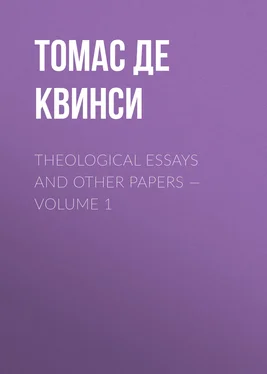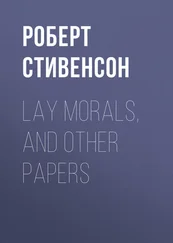Томас Де Квинси - Theological Essays and Other Papers — Volume 1
Здесь есть возможность читать онлайн «Томас Де Квинси - Theological Essays and Other Papers — Volume 1» — ознакомительный отрывок электронной книги совершенно бесплатно, а после прочтения отрывка купить полную версию. В некоторых случаях можно слушать аудио, скачать через торрент в формате fb2 и присутствует краткое содержание. Жанр: foreign_prose, foreign_religion, literature_19, foreign_antique, на английском языке. Описание произведения, (предисловие) а так же отзывы посетителей доступны на портале библиотеки ЛибКат.
- Название:Theological Essays and Other Papers — Volume 1
- Автор:
- Жанр:
- Год:неизвестен
- ISBN:нет данных
- Рейтинг книги:3 / 5. Голосов: 1
-
Избранное:Добавить в избранное
- Отзывы:
-
Ваша оценка:
- 60
- 1
- 2
- 3
- 4
- 5
Theological Essays and Other Papers — Volume 1: краткое содержание, описание и аннотация
Предлагаем к чтению аннотацию, описание, краткое содержание или предисловие (зависит от того, что написал сам автор книги «Theological Essays and Other Papers — Volume 1»). Если вы не нашли необходимую информацию о книге — напишите в комментариях, мы постараемся отыскать её.
Theological Essays and Other Papers — Volume 1 — читать онлайн ознакомительный отрывок
Ниже представлен текст книги, разбитый по страницам. Система сохранения места последней прочитанной страницы, позволяет с удобством читать онлайн бесплатно книгу «Theological Essays and Other Papers — Volume 1», без необходимости каждый раз заново искать на чём Вы остановились. Поставьте закладку, и сможете в любой момент перейти на страницу, на которой закончили чтение.
Интервал:
Закладка:
Here, and in all other critical periods of ancient republics, we shall find that opinions did not exist as the grounds of feud, nor could by any dexterity have been applied to the settlement of feuds. Whereas, on the other hand, with ourselves for centuries, and latterly with the French, no public contest has arisen, or does now exist, without fighting its way through every stage of advance by appeals to public opinion. If, for instance, an improved tone of public feeling calls for a gradual mitigation of army punishments, the quarrel becomes instantly an intellectual one: and much information is brought forward, which throws light upon human nature generally. But in Rome, such a discussion would have been stopped summarily, as interfering with the discretional power of the Praetorium. To take the vitis , or cane, from the hands of the centurion, was a perilous change; but, perilous or not, must be committed to the judgment of the particular imperator, or of his legatus. The executive business of the Roman exchequer, again, could not have been made the subject of public discussion; not only because no sufficient material for judgment could, under the want of a public press, have been gathered, except from the parties interested in all its abuses, but also because these parties (a faction amongst the equestrian order) could have effectually overthrown any counter-faction formed amongst parties not personally affected by the question. The Roman institution of clientela —which had outlived its early uses—does any body imagine that this was open to investigation? The influence of murderous riots would easily have been brought to bear upon it, but not the light of public opinion. Even if public opinion could have been evoked in those days, or trained to combined action, insuperable difficulties would have arisen in adjusting its force to the necessities of the Roman provinces and allies. Any arrangement that was practicable, would have obtained an influence for these parties, either dangerous to the supreme section of the empire, or else nugatory for each of themselves. It is a separate consideration, that through total defect of cheap instruments for communication, whether personally or in the way of thought, public opinion must always have moved in the dark: what I chiefly assert is, that the feuds bearing at all upon public interests, never did turn, or could have turned, upon any collution of opinions. And two things must strengthen the reader's conviction upon this point, viz. first, that no public meetings (such as with us carry on the weight of public business throughout the empire) were ever called in Rome; secondly, that in the regular and 'official' meetings of the people, no social interest was ever discussed, but only some political interest.
Now, on the other hand, amongst ourselves, every question, that is large enough to engage public interest, though it should begin as a mere comparison of strength with strength, almost immediately travels forward into a comparison of right with rights, or of duty with duty. A mere fiscal question of restraint upon importation from this or that particular quarter, passes into a question of colonial rights. Arrangements of convenience for the management of the pauper, or the debtor, or the criminal, or the war-captive, become the occasions of profound investigations into the rights of persons occupying those relations. Sanatory ordinances for the protection of public health; such as quarantine, fever hospitals, draining, vaccination, &c., connect themselves, in the earliest stages of their discussion, with the general consideration of the duties which the state owes to its subjects. If education is to be promoted by public counsels, every step of the inquiry applies itself to the consideration of the knowledge to be communicated, and of the limits within which any section of religious partisanship can be safely authorized to interfere. If coercion, beyond the warrant of the ordinary law, is to be applied as a remedy for local outrages, a tumult of opinions arises instantly, as to the original causes of the evil, as to the sufficiency of the subsisting laws to meet its pressure, and as to the modes of connecting enlarged powers in the magistrate with the minimum of offence to the general rights of the subject.
Everywhere, in short, some question of duty and responsibility arises to face us in any the smallest public interest that can become the subject of public opinion. Questions, in fact, that fall short of this dignity; questions that concern public convenience only, and do not wear any moral aspect, such as the bullion question, never do become subjects of public opinion. It cannot be said in which direction lies the bias of public opinion. In the very possibility of interesting the public judgment, is involved the certainty of wearing some relation to moral principles. Hence the ardor of our public disputes; for no man views, without concern, a great moral principle darkened by party motives, or placed in risk by accident: hence the dignity and benefit of our public disputes; hence, also, their ultimate relation to the Christian faith. We do not, indeed, in these days, as did our homely ancestors in the sixteenth and seventeenth centuries, cite texts of Scripture as themes for senatorial commentary or exegesis ; but the virtual reference to scriptural principles is now a thousand times more frequent. The great principles of Christian morality are now so interwoven with our habits of thinking, that we appeal to them no longer as scriptural authorities, but as the natural suggestions of a sound judgment. For instance, in the case of any wrong offered to the Hindoo races, now so entirely dependent upon our wisdom and justice, we British [Footnote: It may be thought that, in the prosecution of Verres, the people of Rome acknowledged something of the same high responsibility. Not at all. The case came before Rome, not as a case of injury to a colonial child, whom the general mother was bound to protect and avenge; but as an appeal, by way of special petition, from Sicilian clients. It was no grand political movement, but simply judicial. Verres was an ill-used man and the victim of private intrigues. Or, whatever he might be, Rome certainly sate upon the cause, not in any character of maternal protectress, taking up voluntarily the support of the weak, but as a sheriff assessing damages in a case forced upon his court by the plaintiff.] immediately, by our solemnity of investigation, testify our sense of the deep responsibility to India with which our Indian supremacy has invested us. We make no mention of the Christian oracles. Yet where, then, have we learned this doctrine of far-stretching responsibility? In all pagan systems of morality, there is the vaguest and slightest appreciation of such relations as connect us with our colonies. But, from the profound philosophy of Scripture, we have learned that no relations whatever, not even those of property, can connect us with even a brute animal, but that we contract concurrent obligations of justice and mercy.
In this age, then, public interests move and prosper through conflicts of opinion. Secondly, as I have endeavored to show, public opinion cannot settle, powerfully, upon any question that is not essentially a moral question. And, thirdly, in all moral questions, we, of Christian nations, are compelled, by habit and training, as well as other causes, to derive our first principles, consciously or not, from the Scriptures. It is, therefore, through the doctrinality of our religion that we derive arms for all moral questions; and it is as moral questions that any political disputes much affect us, The daily conduct, therefore, of all great political interests, throws us unconsciously upon the first principles which we all derive from Christianity. And, in this respect, we are more advantageously placed, by a very noticeable distinction, than the professors of the two other doctrinal religions. The Koran having pirated many sentiments from the Jewish and the Christian systems, could not but offer some rudiments of moral judgment; yet, because so much of these rudiments is stolen, the whole is incoherent, and does not form a system of ethics. In Judaism, again, the special and insulated situation of the Jews has unavoidably impressed an exclusive bias upon its principles. In both codes the rules are often of restricted and narrow application. But, in the Christian Scriptures, the rules are so comprehensive and large as uniformly to furnish the major proposition of a syllogism; whilst the particular act under discussion, wearing, perhaps, some modern name, naturally is not directly mentioned: and to bring this, in the minor proposition, under the principle contained in the major, is a task left to the judgment of the inquirer in each particular case. Something is here intrusted to individual understanding; whereas in the Koran, from the circumstantiality of the rule, you are obliged mechanically to rest in the letter of the precept. The Christian Scriptures, therefore, not only teach, but train the mind to habits of self -teaching in all moral questions, by enforcing more or less of activity in applying the rule; that is, in subsuming the given case proposed under the scriptural principle.
Читать дальшеИнтервал:
Закладка:
Похожие книги на «Theological Essays and Other Papers — Volume 1»
Представляем Вашему вниманию похожие книги на «Theological Essays and Other Papers — Volume 1» списком для выбора. Мы отобрали схожую по названию и смыслу литературу в надежде предоставить читателям больше вариантов отыскать новые, интересные, ещё непрочитанные произведения.
Обсуждение, отзывы о книге «Theological Essays and Other Papers — Volume 1» и просто собственные мнения читателей. Оставьте ваши комментарии, напишите, что Вы думаете о произведении, его смысле или главных героях. Укажите что конкретно понравилось, а что нет, и почему Вы так считаете.












